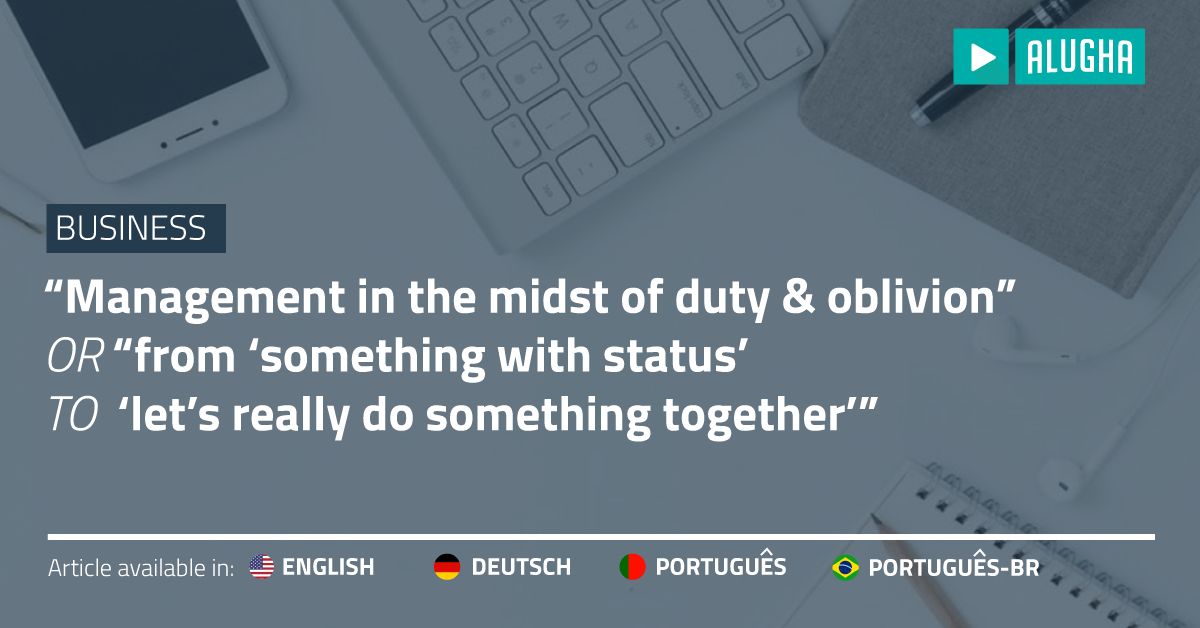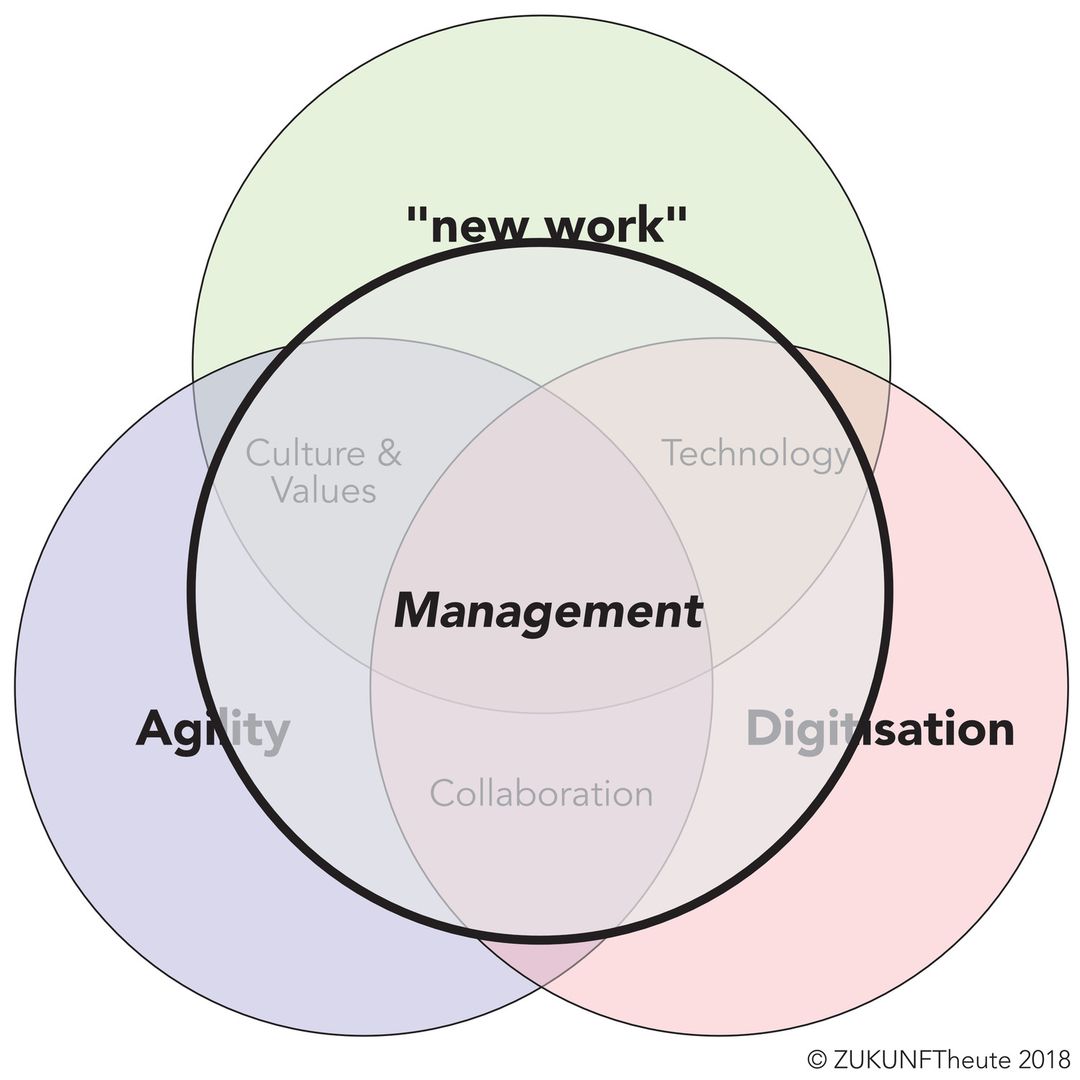Alugha Updates | March 2022 - what's new at alugha
Here at alugha, we love technology and leveraging it in creative ways for our users to provide unique features and a stellar experience.
“Management is the art of orchestrating best possible collaboration in an organization.” Where this “art” (for me) combines both, the willingness and the ability to act. Both have to be reflected in the two main areas of management: in the function “management” (the “how” and “what”) and the institution “management” (the “who”).

Read this article in: Deutsch, English, Português
Estimated reading time:5minutesAt the same time, the institutional part of management often gets blamed for being unable to meet the bulk of this requirement of its stakeholders. At the same time, and that’s part of the dilemma, many managers get along quite well with what they experienced and learned (so far) of what’s their task in management. There seems to be not needed for change on that level — but there is! Maybe even more than in any other part of our organizations!
The core tasks of management (as a function and as an institution) are to create clarity, regarding the direction, and to define the conditions for superb cooperation. This includes defining and building structures that allow the employees to be capable to provide their (value) contribution along with their part of the value chain.
In current management models (bureaucracy and meritocracy), management teams create that clarity e.g. by creating hierarchies, key figures, and central communication. Thus the core responsibility for providing information and for making decisions is with the institution of “management”. Therefore it instructs controls, measures and steers behaviors, decisions and “the business”. In this logic, planning is assumed to be realistic and able to actively influence the companies results and its environment. To achieve this, its enough to set out relatively simple goals/visions, e.g. to increase the yield by 5%, or the plan to expand abroad.
“New” management models that are better adapted to the new market- and competition-driven demands put on companies (and management) have long been spreading around already. Models that, however, require a fundamental change in the mindset of well-established managers and are therefore anything but quick and easy to implement.
Fast, dynamic, agile structures require different frameworks and different thinking from those who define these frameworks. Instead of having a firm grip on the organization and a clear overview at all times, the new models (such as e.g. adhocracy) are intentionally “letting go”. Responsibility for performance lies, unlike before, with the people in the organization itself. Such structured companies are able to respond more quickly and effectively to their market environment, to better serve them, and to deliver higher quality, more innovative products.

What sounds like less management effort is at real an immense learning task and, if it succeeds, leads to a much higher level of qualification and a complete set of different and new requirements for managers.
To give the organization the clarity it needs in a volatile, ambiguous environment, it is important to identify long-term trends early, to translate them into appropriate, motivating, engagement-enhancing objectives, and to create meaning and purpose, where before only a constantly changing chaotic market was perceived.
This is the same driver for change in markets and business environments as it’s been identified for digital, agile, and new-work transformations. All transformations that simultaneously move the cultural foundations of companies. Transformations that absolutely demand the described change in the management model (function) and the management mindset (institution) to avoid fatal breakdowns.
In the worst case, with leaving this fundamental change out, companies might emerge whose outer shell is agile, dynamic, digital, but which at the core try to function according to old patterns. An attempt that always fails and leads to significantly below-average company development. An attempt that contradicts the core task of management to ensure optimal interaction.
Further demands on this new interaction increase the need for ”new management”. Networking and creativity need to be promoted throughout the company and more openness for experiments with new ideas must be established. This is a new meaning of the old task to create the best possible framework for success.
In order to ensure the effectiveness of management (function & institution) and to shape change, several different approaches are possible depending on the urgency and necessity of change.
Some companies that want or have to go through all named transformations quickly rely on the fastest possible implementation of self-organization. The “secondary responsibilities” of the old management models, such as the planning and control of processes, the decision-making etc. are transferred ad hoc to the organization. A few organizations survive this (and are repeatedly cited in the press as an example). Others quietly die from it.
The long way
Companies that have plenty of time to address this management change, for example, because they serve relatively old, less dynamic and innovation-threatened markets, can simply rely on sound training from their management (institution). For many managers an introduction to the topics of “leadership” and “lifelong learning”.
Companies that are already in one of the mentioned transformation processes, or recognize that it is time to address them, need to start multidimensional deliberate reflections on both, personal and organizational level. This should be followed by a joint, participative and continuous development process, which also involves the management, and allows to redesigned and set up all elements that need change — without compromise!
All these approaches have in common that the steps are about rebuilding lost trust in “management” (general perception of function & institution). Too long it has been accepted that unethical behavior of some managers (institution) caused massive damage, which resulted in fundamental mistrust throughout the organization.
Good, up-to-date management is important — more important than ever!The question that every company, every stakeholder should ask is, whether a necessary change should take place as revolution or evolution, as an act of rebuilding (like a phoenix from the ashes), or as a renewal, as a medium-term renewal process during full operation.
There’s no question who ultimately has to pay for this necessary change. It is (again) the management (function & institution). Either it remains unable to adapt and resist even on the track, or it selectively invests in measures that bring it and the company further.
But — this decision is with management.
Guido Bosbach is the founder of ZUKUNFTheute, consultant mentor for top management. He's a leading expert in successful cooperation and contemporary management design. In December 2017, he was named one of the 25 LinkedIn Top Voices 2017 D-A-CH. This article was originally published on Linkedin.
If you want to write your own blog post, please send your suggestion by email.
Thanks for reading!
Wilgen and the alugha Team!
#alugha
#doitmultilingual
#everyone‘slanguage
#GuidoBosbach
| Code | Name | Views | Percentage |
|---|---|---|---|
| eng | English | 415 | 65.56% |
| deu | Deutsch | 133 | 21.01% |
| por | Português | 85 | 13.43% |
| Total | 633 | 100% | |
Here at alugha, we love technology and leveraging it in creative ways for our users to provide unique features and a stellar experience.
Here at alugha, we love technology and leveraging it in creative ways for our users to provide unique features and a stellar experience.
Alugha is a video translation tool that streamlines the production and collaboration process for high-quality content tailored to international audiences. Learn more at: https://appsumo.8odi.net/get-the-starter-pack You’re ready to share your videos with the whole wide world. But like a certain co
IZO™ Cloud Command provides the single-pane-of-glass for all the underlying IT resources (On-premise systems, Private Cloud, Cloud Storage, Disaster Recovery, Amazon Web Services, Microsoft Azure, Google Cloud Platform, etc). About Tata Communications: Welcome to Tata Communications, a digital ecos
A revolutionary new service in the video industry! Our report is about the unique alugha platform. Alugha gives you the tools to make your videos multilingual and provide them in the language of your viewers. Learn more about the great features of the platform here: https://alugha.com/?mtm_campaign